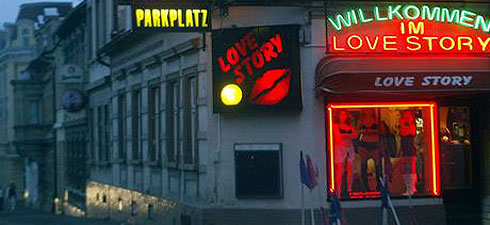“Willkommen im Lovestory”. When you went through Dubí, a northern village in the Czech Republic, it was almost impossible back in those days to overlook this lit-up green and yellow neon sign smack in the middle of town. Set above the windows in which one could always ogle a few girls wiggling around, the sign shone in the street for years. In its heyday, the town of Dubí, a symbol of cross-border prostitution, boasted no fewer than 50 brothels. Now there are only four left eking out a meager existence. And they are bound to close up shop soon. About a month ago the sign was changed. Now it says “Drugstore, household products”. A “just opened” sign has been put in the window, too, behind which shampoos have supplanted the ladies of pleasure. The number of night clubs and houses of pleasure on the Czech border has nosedived since last year. The financial crisis has got the better of their customers, most of whom came from German and Austrian border towns. This is the end of an era. For nearly 20 years, the Czech villages tried to put an end to local prostitution. And in recent months they have been gradually becoming ordinary villages again.
“The opening of the cross-border motorway, which most foreign drivers now take, struck the first blow against local prostitution,” explains Petr Pípal, Dubí’s mayor. “Besides, the recent ordinance authorizing us to ID night club-goers has proven effective. The economic crisis did the rest: customers have stopped coming here to look for brothels.”
The police and sex trade experts confirm that the majority of the prostitutes in the border zone have moved further west – towards Germany and Spain. Moreover, many of the girls selling their bodies in Dubí or Rozvadov were not from the Czech Republic. Most of them were Romanian or Bulgarian. Hana Malinová from the association Rozkoš bez rizika [“Pleasure Without Risk”] points out: “Now that their countries have joined the European Union, they can travel freely all over the continent. So they’ve gone where there’s more money to be made.” The association has been observing the prostitutes’ behaviour for several years.
Only a handful of establishments are still up and running: there’s the Kiss, the Venezia or the Libido. The Sauna is no longer open at the weekend. “I remember a time when in Dubí alone there were 400 prostitutes,” recalls a vice squad chief in charge of the region of northern Bohemia. “Nowadays, there are only 20 or 30 of them left, roughly four per brothel.” Those who remain earn less than before, at most €40 for an hour of sex, or a little over a thousand Czech crowns. The streetwalkers ask only half that. “I often don’t get a single client all day,” confides Ilona, a 28-year-old prostitute. She explains that she used to work in one of the Dubí brothels, but now prefers to “walk the street” – or rather the road connecting Dubí to Teplice – which, she says, brings her closer to “her customers”.
Brothel owners have changed too. Bulgarians and ex-Yugoslavians have given way to local “entrepreneurs”. According to the vice squad chief, “this goes to show how hard hit the sex trade is in Dubí. If it were still turning a profit, the Bulgarians and Kosovo Albanians would’ve stayed.” The mayor of Křimov clearly agrees: “The customers were 99% Germans. But it’s over. Only three of these establishments are left, versus about 20 back then. This is clearly one of the consequences of the financial crisis.”
Was this article useful? If so we are delighted!
It is freely available because we believe that the right to free and independent information is essential for democracy. But this right is not guaranteed forever, and independence comes at a cost. We need your support in order to continue publishing independent, multilingual news for all Europeans.
Discover our subscription offers and their exclusive benefits and become a member of our community now!












